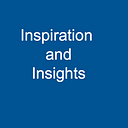Leaving Our Comfort Zones: Growing Forward - In Conversation with Sherie Hickman
Most people and organizations struggle with stepping out of their comfort zones. If everything is going well enough, why risk trying something new?
We posed this question to Sherie Hickman, a highly experienced thought partner, sustainable change steward, and results-driven, inclusive leader. Sherie is a risk taker who is comfortable with ambiguity and who relentlessly pursues opportunities for personal and organizational growth.
Sherie, you’re someone who is always looking for new doors to open and for ways to do things better. Can you talk to us about your approach to personal and professional growth?
I am fortunate in that by the time I was a junior in high school, I knew what I wanted to do with my life. I wanted to be a hospital administrator (or an Olympic skier, but the first option was more realistic!). When I finished my education and started work, I realized health care was a broad and amazing field. The process of learning truly energizes me, and I wanted to learn it all.
I started in acute care hospitals. Then I had a series of other great opportunities. Although I had no experience in many of these areas, I was given the chance based on my track record. First, I ran an ambulatory care practice. Next, I ran a health plan. Mid-career, I spent a number of years running post-acute programs, from skilled nursing facility to hospice and psychiatric outreach.
I didn’t come into this profession saying, I’m going to be a CEO in five years. I found that when we want to learn, opportunities naturally come our way to expand our skill set — and grow forward.
How has your perspective on growing forward affected your leadership style?
I’m comfortable with moving through change and leading in times of ambiguity. I’ve had colleagues who’ve preferred to stay in one lane. They’ve been bound by fears that they may not have their job in a year or two because of a circumstance beyond their control, such as a merger. A couple of times in my career I’ve been out looking for a job when I didn’t expect to be looking. I’ve always felt confident about my ability to land the next opportunity, and every time that’s happened, it’s moved me into a much better position.
We’re sure you’re often asked for advice on job searching. What guidance do you offer?
As Socrates, the ancient Greek philosopher, said, ‘Know yourself.’ Prioritize yourself and your wellbeing so you can find your best fit — and then give your best to the organization you choose.
Believe in your skills. Don’t stay anywhere that doesn’t value what you have to offer or doesn’t grow you in ways you want to grow. Be open to finding new opportunities and to knowing when it’s time to do something different.
For me, working in many different organizations — and across the whole continuum of care — was exactly what suited me best. When I decide it’s time for me to step into something new, such as more board service, I know the breadth and scope of my learning in this amazing profession of health care will carry me forward and bring value.
How would your leadership style apply to board service?
I’m reminded of something that happened years ago when I was doing some team-building work. After we took a personality survey, the facilitator shared my profile with the group. ‘You have a leader here,’ he said. ‘Whether you’re with her or not, she’s going to charge the hill. She’s going to go after the gnarly stuff when she thinks it’s the right thing to do.’
In board service, I would hope to ‘go after the gnarly stuff’ — all while keeping board leaders focused on what’s important to the organization. Even if we have to make difficult decisions or initiate uncomfortable changes, there’s a way to ‘do it right,’ to ask the right questions, and to stay true to our mission and values. The executive team will feel the board’s support and know the board has their back if ever they need to charge the hill.
Your story is an inspiring one, Sherie. Thank you!
Connect with Sherie on LinkedIn.
*****
Sherie Hickman is a positive change agent, strategic thinker, and devoted community leader. Throughout her 25-year career as a health care industry executive, she has taken a structured approach to dealing with challenges and disruption — and designing and executing concrete action steps for enduring improvements.
